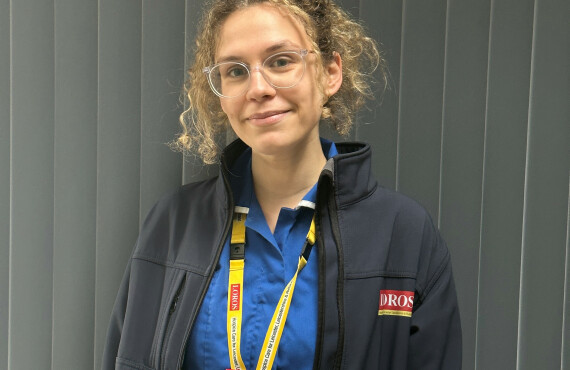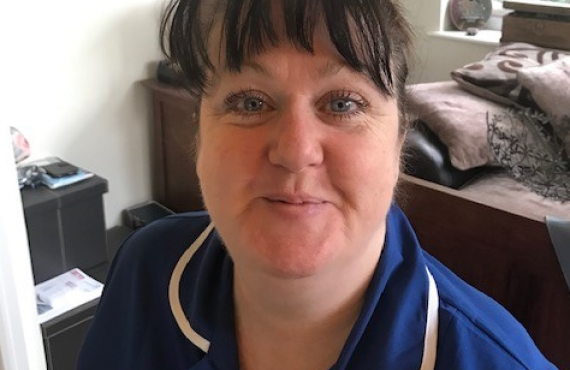ICSPCT News
Latest news from the Community Specialist Palliative Care Team- August 2023

A day in the life of Duty CNS
"At home getting ready for another day in the Triage centre, I always feel happy and look forward to the challenge ahead and seeing the lovely girls I work with again.
There is never a morning that I don’t think how lucky I am that I have been given the opportunity to spend my last few working years, however long that may be, working 2 days a week, in the Triage centre. After the seclusion of working through COVID it was a joy to get back to an office and have colleagues around again.
I have been a CNS for the past 26 years, with all but the last few months spent out and about visiting patients in their own homes. This experience has given me a great grounding for the Duty CNS role, I have learnt the difficult skill of eliciting patients’ problems and issues over the phone, questioning and teasing out information that is so vital when you are not face to face.
My shift is 10am until 6pm and on arrival it’s time to make a coffee, get my headphones on and log on to Sys1 while, at the same time, having a quick catch up with everyone in the office.
Usually there is a list of anything upwards of 10 tasks waiting from patients, relatives & heath care professionals needing our help & support with a mix of issues and varying degrees of urgency.
There will also be a Rapid Response Coordinator triaging next to me, sifting through the urgent tasks for the Rapid Response Team. Working out which is for CNS and which is for the Rapid Response Co-ordinator can be difficult at times, referrers often put things through for urgency of 2 or 24 hours for the Rapid Response team when it is a for CNS to give advice and support or a 7 working day referral for a CNS for me to triage.
I find the Duty CNS role challenging, every day and every task brings a different set of problems and issues to address. Liaising with other professionals and health care agencies is also an integral part of my role, enhancing communication between all health care and social care staff improving the outcome for the patients and families and giving a more seamless service.
We often sit and brainstorm, with the co-ordinator, who is the most appropriate person to look at the task and talk through the more complex issues & problems to ensure the best outcome for those needing our support. If there is something that we need help with regarding symptom control we have the LOROS medical advice line that we can contact if needed.
Another important aspect of my role is to document each interaction in as much detail as possible, this is vital element of my work as we need to evidence everything that we do, this keeps a patient’s medical information up to date and support audit.
We have a small, lovely team of admin staff who are always willing to help and support us. It can take anything from 15 minutes to 2 hours to sort out each individual task and is sometimes impossible to respond to every task by the end of my shift. I will often hang on to relieve the pressure on colleagues who are working until 10pm.
As the months march on, the volume of tasks reaching us every day has increased vastly, I always look forward to the CNS logging into triage 4pm until 6pm, it is a relief knowing they are helping out with the tasks that are coming in thick and fast.
There is a true sense of comradeship and support amongst all the staff, all the above is intertwined with supporting each other, including the Rapid Response Team, who come into the office from visiting and caring for patients and families in their own homes. They have often been in very highly charged, emotional situations and need to debrief before they dust themselves down and go back out into the community to do it all over again, which they inevitably do."

Palliative care board rounds
The Integrated Community Specialist Palliative Care Matron, Michelle Law, and Community Nursing Matron, Amii Ball, have been working on a way for both community teams to work collaboratively to best meet the needs of our palliative and end of life patients.
“We have written a standard operating procedure for palliative care board rounds, to enable a unified process to be followed in all localities”.
The purpose of the board rounds will be an approach towards step up/step down of patients between ICSPC and Community Nursing. This is in the hope that we can reduce the number of rejected referrals between the teams and reduce the time that patients can ‘ping’ around between community services before receiving the correct care by the most appropriate team.
Palliative board rounds will run 3 times a week with each locality being allocated a specific day.
The meetings will take place between 10-11 am via MS Teams:
• East locality will meet on a Tuesday.
• West locality will meet on a Wednesday.
• City East and West will meet on a Thursday.
We hope that once these are running effectively, we can then invite our primary care colleagues along and take an MDT approach in achieving good quality, streamline care for our mutual patients out in the community. If there are any primary colleagues interested in being involved, please contact Michelle on 07719 544831.
Community multi-disiplinary team meeting
Recently we have piloted, with success, a community multi-discplinary team (MDT) with LOROS professionals from various disciplines. They are coming together to support the nursing team in ICSPC with patient care.
All feedback from both the LOROS team members and the nurses has been positive so far showing benefits across the services, enhancing relationships across the teams and has given the nurses access to wider resource and ideas for managing patient care especially in complex situations. It has also led to more appropriate referrals between teams and LOROS teams having insight into patients and their home lives when they come to LOROS, whether that is the inpatient ward, day therapy or wellbeing services.
Everyone involved is in agreement that the current model should continue as it is effective in building relationships and guiding patient care. The professionals involved are:
CNSs
Enablement (OT/PT)
Compassionate Neighbours
Day Therapy
Complementary Therapy
Counselling
Medics
Social Work
Safeguarding
Community nursing are invited by individual CNSs if they are involved with a patient.
There are some great stories about where patient care has benefitted from this meeting and it is also a great learning forum for all involved.
In our next issue we will share a patient story of how they transitioned seamlessly through services enabled by this MDT.
Read more
Congratulations to Mia!
Congratulations to CNS Mia Maxwell who has secured a 6 month position as deputy team for the CNS team at LOROS. This role was developed to support the lead and the team and Mia has already proved she is a technical whizz supporting with rostering and the more complex aspects of SystmOne. This role will be reviewed in the coming months to see if further funding can be secured for it to continued.
Mia said: "I am really excited about the opportunity and I already feel that I am making a positive impact in supporting my colleagues. I work 90% as a CNS and 10% as a manager and find this is helpful for my team in having someone available for further support and advice. I find system one really interesting and the reports we get weekly for data quality, non-patient contact, PTL's, UCRs and RTT's all go so far in helping with funding for the service and the bigger impact this has on the ICSPCT team.
I was so happy to secure the position as I am so excited in supporting my colleagues and understanding things from their point of view really helps give an insight into the team on the ground but also how it works behind the scenes as a manager trying to run a very busy and productive service- I love it!"

Patient and carer feedback
Your team were exceptionally caring and I must specially mention Janet, she was so helpful at making suggestions of things that we might need to assist us look after C . She was always very calm in her approach – a great comfort
Donna is friendly and easy to talk to. She explains things very well and thoroughly, making sure we know how and why she is suggesting a few changes regarding pain relief treatment. She also listens to us and is patient with us
Communication, care to the next level, supportive and informative, kind and sympathetic, overall professional and lovely. We just wish they had of come into your care a little sooner
We would like to extend our sincere thanks to all the amazing nurses & HCA's.You were all truly marvellous- you treated her with such dignity, respect and kindness and we will be forever grateful for you all that you did. You came into our lives for the briefest of time, but remarkably enabled us to have precious time with her we thank you from the bottom of our hearts
Natasha achieves the European Certificate
Natahsa Kazinski is the latest CNS to achieve the European Certificate in Essential Palliative Care, this is degree level learning that is fundamental to the care we give patients. It has now been added to the CNS development Plan as a core competency for all the nursing team.
ECPEC is an accredited course, it is A multi professional programme designed to meet the needs of healthcare professionals with an interest in palliative and end of life care. It’s an opportunity to learn about the principles of palliative care, to help support people receiving a palliative care approach to have a better death regardless of setting.
Congratulations to Natasha!

